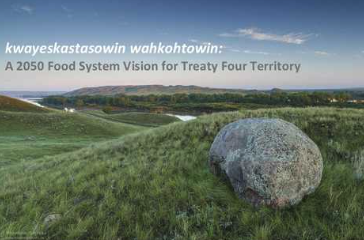Indigenous food systems featuring rotational grazing among Rockefeller’s Food System Vision Prize finalists
The Rockefeller Foundation may soon be funding two food system projects that focus on supporting indigenous agricultural practices, which include well-managed livestock in rotational grazing systems.
The Food System Vision Prize invites organizations across the globe to create a vision of the regenerative and nourishing food system that they want to create by 2050. Beginning almost a year ago in October 2019, teams have been working on building their collaborative visions. The competition is hosted by The Rockefeller Foundation in partnership with SecondMuse and OpenIDEO.
Recently, ten applicants have been selected to proceed to the competition accelerator program. It will provide mentorship, collaborative learning, and workshops with advisors so the teams can hone their visions.
The “Top Visionaries” will be announced on December 14, 2020. Two million dollars is up for grabs as well as continued support from the accelerator program to bring the winners’ visions to life.
Among the 10 finalists, two projects highlight the well-managed grazing of ruminant animals as part of their visions.
Empowering Indigenous Food Systems in Saskatoon
The first project is called kwayeskastasowin wahkohtowin: A 2050 Food System Vision for Treaty Four Territory. Led by the Natural Systems Agriculture Laboratory at the University of Manitoba, the multi-stakeholder effort also incorporates a variety of stakeholders including members of the indigenous community, local farmers, scientists and conservationists.
According to the project team, Treaty 4 was established in 1874 between Cree and Saulteaux First Nations and the British government. Representative of the prairie biome, Treaty 4 territory encompasses southern Saskatchewan and portions of Alberta and Manitoba. Several vision team members were born/live/work in this territory. The project would target 100,000 km2 of the southern Canadian Prairie Provinces
“Creating a vision for Treaty 4 territory aligns our food system vision with the process of decolonization and reconciliation between Indigenous and settler populations,” wrote the team in its proposal summary. “We believe that creating a just and sustainable agrifood system is dependent on the unity of the people who contribute to and depend on that system. Treaty Four is a space in which to envision the healing required—among people and with the land—in order to create a common vision for 2050.”
The team’s food system vision incorporates small-scale production of livestock using rotational grazing practices as well as a move towards natural, unprocessed foods and more demand for locally-produced foods. Reviving the prairie and parkland ecosystems will also enable the indigenous peoples to increase their access to traditional plant and animal foods and medicines.
Reclaiming relationships to the land and culture in South Dakota
The second project centered around indigenous food system support is called 7Gen Food System. Led by the Sicangu Community Development Corporation, the project focuses on the Rosebud Indian Reservation in South Dakota covering an area of roughly 915,000 acres.
“The Rosebud Indian Reservation in south-central South Dakota, home of the Sicangu Lakota Oyate, is an area rich in culture and history,” according to the team. “Sicangu people have inhabited this Place for generations, developing deep and complex relationships with the land. Lakota culture and spirituality recognizes the interconnectedness and interdependence of all things - earth, plants, animals, and humans. In order to be a good relative, great care and respect is taken in everything that is done. Traditionally, Lakota did not own land or claim it as their own, instead recognizing the inherent right and responsibility of all relatives, be they human or not, to collectively care for it.”
As part of its food system vision, the team plans to rotationally graze buffalo and cattle to restore soil health and native prairie grasses that flourish with the presence of traditional buffalo herds. They also plan to establish a Sicangu seed library that will save seeds that have grown the best in the region starting with heirloom varieties that are already adapted to the climate.
Some of the team’s vision includes supporting smallholder farms and micro-loans for beginning producers. They also hope to create land-based educational opportunities for young people so that members of the Rosebud community.
“These experiences will allow our relatives to redefine ‘regenerative’ in our own terms; defining what it means to be Lakota by healthy choices and a good relationship with the land.”
Indigenous communities face serious challenges to establishing culturally appropriate and secure food systems
The Rockefeller competition may help provide the financial and resource support for projects seeking to revitalize indigenous communities' relationship to land, food, and cultural practices, but there is more work to be done in this arena. American Indian and Alaska Native farms make up only 3% of all farms in the US, according to the Indigenous Food and Agriculture Initiative. Indigenous communities face serious challenges in the form of lack of access to land, lack of access to culturally appropriate foods, and epidemic levels of diet-related diseases, according to the First Nations Development Institute.
A number of organizations are attempting to address these challenges particularly when it comes to the lack of funding support. Only three-tenths of one percent of foundation funding supports Indigenous causes even though Native Americans make up over two percent of the US population, according to the First Nations Development Institute.
If you are interested in learning more about supporting efforts to empower Indigenous communities in agriculture and food systems work check out The Native Women’s Association of Canada, Seeds of Native Health, Traditional Native American Farmers Association, The Cultural Conservancy, Dream of Wild Health, and White Earth Land Recovery Project. This is not an exhaustive list. Research groups in your local community to learn more about how you can help combat food system inequality near you.



